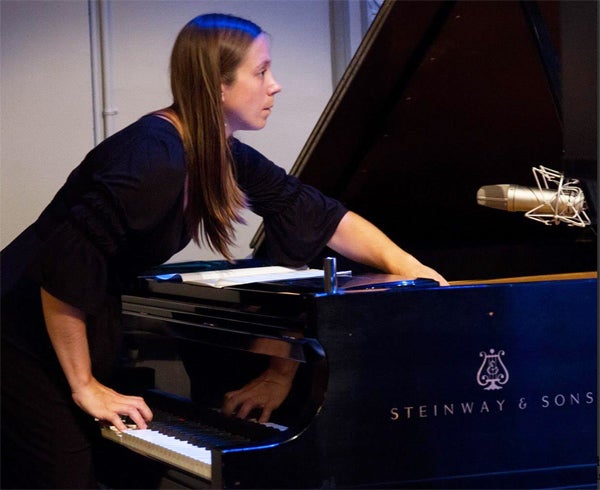Embracing Life’s Rhythm
Dr. Kirsten Volness on the Rewards of Her Art Form
For Dr. Kirsten Volness, teaching and creating music is all about making a difference. The composed yet spirited pianist, teacher, composer, and producer is committed to sharing her knowledge and exploring the many facets of her art form. Dr. Volness, a lecturer in the URI Department of Music, is a distinguished, active, and passionate contributor to the musical culture here at URI and throughout Rhode Island. She finds Rhode Island a rich place for artists of all disciplines and levels, emphasizing that its small size belies a bold and diverse cultural community.
 Most recently, Volness added to her long list of accolades and commendations the prestigious Robert and Margaret MacColl Johnson Fellowship, awarded by the RI Foundation. It is one of the most respected awards in the Rhode Island art scene and is quite competitive. Initiated in 2003, the unique Fellowship funds writers, visual artists, and music composers via a three-year rotating cycle. Recipients receive a $25,000 grant to fund creative work.
Most recently, Volness added to her long list of accolades and commendations the prestigious Robert and Margaret MacColl Johnson Fellowship, awarded by the RI Foundation. It is one of the most respected awards in the Rhode Island art scene and is quite competitive. Initiated in 2003, the unique Fellowship funds writers, visual artists, and music composers via a three-year rotating cycle. Recipients receive a $25,000 grant to fund creative work.
Making the win even more meaningful, Volness’s fiancé, URI Adjunct Professor of Art Jacob Richman, was awarded the same Fellowship grant. Although they will use their individual grant awards for separate projects, Volness and Richman collaborate on the Tenderloin Opera Company, which offers creative outlets, aid, and community to homeless people and their advocates through music and theatre. They are also Co-Directors of Verdant Vibes, a new cooperative cross-genre music ensemble. Indicative of Volness’s own creative aims, Verdant Vibes offers “a variety of different musical and composition styles—from simple and traditional to modern and experimental.”
In a similar light, Volness will use the Fellowship to compose, produce, and support her upcoming album of electroacoustic piano and string pieces, and a “multimedia opera”. Volness’s body of work aims to combine the interpretative interactivity of live music and with the more prescriptive nature of electronic components. “You have control over sensory details,” she explains, “but you do not let go of the excitement of the live performer; their presence is really magical.” The Fellowship “gives me the opportunity to focus on my artwork with no strings attached,” Volness says—a gift she describes as “freeing”, especially in light of the full load of courses she currently teaches.
Teaching is an invigorating way through which Volness can give back. “All that time I spent learning—I consumed so much knowledge—if I don’t share it, it would just be a waste.” She emphasizes the motivated, multitalented work ethic of URI’s music students, who “are willing to take risks and are prepared to write, conduct, and play.” Volness stresses that, within the foundation of the liberal arts education, music is a way to “teach teamwork, empathy, listening, and imagination.” Of the upcoming renovations of the URI Fine Arts Center, slated to begin next year, Volness is confident “the expansion of our music technology resources will help bring our entire curriculum further into the 21st century and better prepare students in their professional lives outside URI.”
This application cycle marked Volness’s third time applying for the McCall Johnson Fellowship. As such, she encourages students, as rising professionals and artists to compete against themselves, rather than their peers. “Be flexible in moments of rejection or roadblocks. One door will open when another closes. Push yourself through, be a leader, and if the opportunity is not there, create it for yourself.”
Aria Mia Loberti (Class of ’20 with a triple major in Communication Studies, Philosophy and Political Science), interning as the College of Arts & Sciences Staff Writer, wrote this story.
